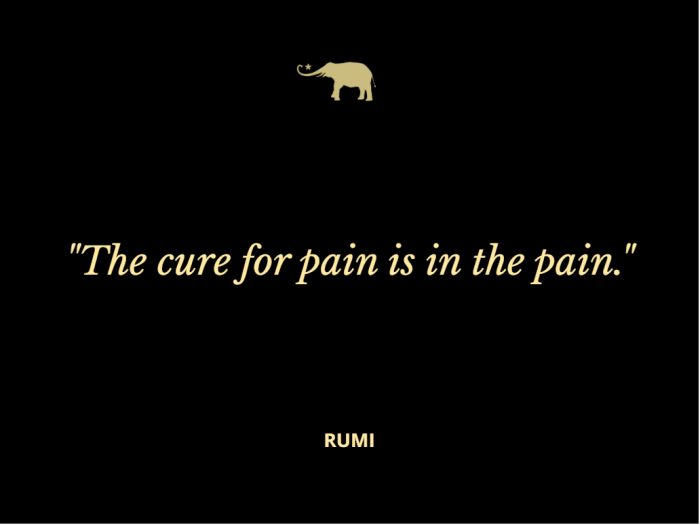View this post on Instagram
“There is a crack, a crack in everything; that’s how the light gets in.” ~ Leonard Cohen
~
First thing in the morning, at first consciousness, I knew bodily that an immense part of me—of my being—was different.
It was missing. Light sneakily streamed through the cracks of my window shade, bringing to my visual sense a half-empty bed. It was hard to determine if the emotional pain I was feeling was sharp or dull. Sharp, yes, because of its intensity, but so complete and enormous, it seemed to encompass all that I felt, saw, tasted, smelled, and heard.
Even the song of birds outside my window were small, powerful needles of a wholly perceived loss, on the drums of my ears.
The separation from my wife of over 20 years was definite. In this regard, I had nothing but the loss and many months of divorce proceedings ahead of me. And yet, as a fully grown man, with a burgeoning consulting business of my own, I needed to rise from the bliss of sleep and get through the day. After all, I was an adult! Though tempted to bury my head in the sand (in other words, my comfy bed), instead out of necessity, I recalled the instructions I had been given in the recent Vipassana (mindfulness) meditation retreat I had attended.
Mindfulness meditation is a contemplative practice, by which we can come to know precisely what is happening in the present moment, and it is practiced often by softly mentally noting the current “mind object.” These mind objects arrive to the doors of our consciousness by way of the senses.
We have the five senses (seeing, hearing, smelling, tasting, and touching), which can be fairly easy to name, and we have mental experiences (remembering, imagining, planning, and so on), which can be known and noted with a little practice. With even more practice, we learn how to name more difficult sensations and experiences, such as “stinging, burning, and hurting,” and even the unpleasant feelings of “regret, sorrow, and fear,” to name a few.
Once, in the kitchen, I spooned ground coffee into my gold, titanium filter and felt a jab, minding that it was for one serving only, not for my wife and I. Ouch. Recalling my meditation teacher’s instructions to note painful mind moments, I softly noted, “Reflecting, reflecting.”
Knowing how intensely possible it is to go down the spiral, lost in a morass of negative emotions, I was quick to note, “Unpleasant, unpleasant, unpleasant!” I had to chuckle slightly at what the tantrum my mind was throwing for me. I reflected (for the 100,000th time in my meditation life) on how much I prefer to have pleasant mind moments. Pleasant sensations. Pleasant feelings and experiences.
“Ah well.”
I carried the coffee to my zafu (meditation cushion) where I sat, noting the strong flavor of my coffee before starting my meditation.
I focused by noticing the sensations of my abdomen as I breathed. “Rising, falling. Rising, falling.” Remembering the good times and then the disintegration of a marriage that was meant to last, I tried to meet the mind moment with a swiftness. To “catch it” before it took my awareness on a long ride, away from the present moment.
Only somewhat successful, the unpleasant sensation of a painful, anxious wave tore through my mid-section. My stomach had always been tied closely to my heart, often with unpleasant effects. When my ex and I first started speaking seriously about a permanent separation, my appetite and digestion had been severely affected. I hadn’t been meditating as often then. The extremity of these unpleasant emotions led me back to my meditation cushion out of a necessity (not to wallow or go into a deep depression).
In my younger years—high school, college, most of my 20s—I took refuge in music, poetry, and the art of my like-minded friends at the time. It was a way that I could understand the suffering that I was facing. The suffering that we all—as humans—are sure to experience. Whereas art and music could be a friend and somewhat “explain” my unpleasant experiences, meditation provided the opportunity to simply be with the experience. Not to change it, but fully welcome, and experience it. In later years, I was able to go inside the sensation—pleasant, unpleasant, neutral—and see what it really was, inside and out.
Don’t get me wrong. What I wanted to do was climb back in bed. What I wanted to do was spend the day in a blanket on the couch, binge-watching my latest show. I wanted to ignore, or otherwise blot out the immense sorrow. But I had work to do and children whom I love in college to support, and I knew that hiding in a cave of comfort and sorrow would not help.
I finished my meditation and went for a walk. Walking down the street, I felt a bit like knives were being jammed into my body at every step. Emotional pain can be like this. Breath can be laborious.
“What’s the use?” My inner child cried out. And then…
Remembering that this is the human experience, that this is what I get to feel, the full spectrum of human emotions—happiness, joy, grief, sorrow, regret, anger, sadness, relief—that this indeed is my homework. Noting that I wanted it to be different, that I wanted it to all be pleasant, I had to chuckle again partly at and partly with myself. This is what I get to explore and be mindful of.
A sense of grace started to eke its way into my battered heart (it had felt quite like it had been dropped in the road and run over by several delivery trucks). A sense of being cared for—and of being part of the great fabric that is the human experience from the beginning of our time here—started to envelope my heart area. Gratitude made its first appearance in weeks, and I nearly bowed down right there in the street, feeling thankful for this opportunity.
Having the unpleasant (at times harrowing) experience of losing this significant relationship in my life was, let’s say, not preferred.
The more I showed up to the moment, to experience it just as it was unfolding, was precisely what I needed to do. I was having an extremely human experience, I was able to feel it, and I was starting to feel grateful for the opportunity, somewhat to my surprise!
Not only did I begin to heal from the great loss, I was able to access parts of myself I didn’t even know I held. I discovered that by allowing all the negative challenging emotions in, to be deeply experienced, I was now able to experience joy in a way that I hadn’t in at least a decade. I learned that by shutting myself off from feeling badly, I was closing the doors of perception to feeling great. Since that time, I’ve been able to access joy much more easily and frequently, and it’s never more than one breath away.
This sense of “elation within the pain” subsided of course later that day, as I went around the spiral block of pleasant/unpleasant/pleasant/unpleasant, but it was not lost. I was fully committed to sticking with the experience of this transition. I knew I would emerge with a broader view of heartache and unpleasant transitions. A deeper love for myself, and a more compassionate heart.
We have been feeling the emotions of loss and heartache since we first climbed out of the ocean and onto dry land. And I don’t want to miss any of it. I am now what is called a “serious meditator,” having a regular, daily practice.
And I am endlessly grateful, as the heartache ultimately transformed me, or rather, the perception of myself. The heartache became a gift.
~









Read 13 comments and reply